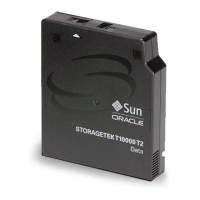Encryption Properties
4.
Set the key value based on the backup:
hostname:shares encryption local key-005 (uncommitted)> set
key=d6a5b801ffb93fcb19ef70a11d662d8092f243c5d4ccd0cd34264b15dd0b7739
key = d6a5b801ffb93fcb19ef70a11d662d8092f243c5d4ccd0cd34264b15dd0b7739
(uncommitted)
5.
Save the key:
hostname:shares encryption local key-005 (uncommitted)> commit
If the keyname is used with existing shares, you will be alerted:
Existing shares reference the key Mykey from the LOCAL keystore. Are you sure? (Y/N)
To overwrite the key value in the existing shares, type Y. Type N to not add the new key.
You can then change the key used for those shares before repeating this procedure and
restoring the original key. For more information, see “Changing a Share Encryption Key
(CLI)” on page 574.
Related Topics
■
“Changing a Share Encryption Key (CLI)” on page 574
■
“Backing Up a LOCAL Key (CLI)” on page 575
■
“Deleting an Encryption Key (CLI)” on page 578
Encryption Properties
The following list shows the encryption properties available for managing keys, creating keys,
and creating encrypted projects and shares.
■
LOCAL Key Management Properties
■
Master Passphrase - The master passphrase is used to generate an AES key for
encrypting the keys stored in the LOCAL keystore. The PKCS#5 PBKDF algorithm is
used to generate the key and the key is randomly generated and managed by the system.
■
LOCAL Key Creation Properties
■
Keyname - Name to identify the key.
■
Generate Key Automatically - Automatically generate the key.
■
Key - Hex-encoded raw 256-bit key, stored in an encrypted form, if automatic key
generation is not selected.
■
OKM Key Management Properties (supplied by your OKM administrator)
■
Key Manager Server - IP address of your Oracle Key Manager (OKM) server.
Data Encryption 581

